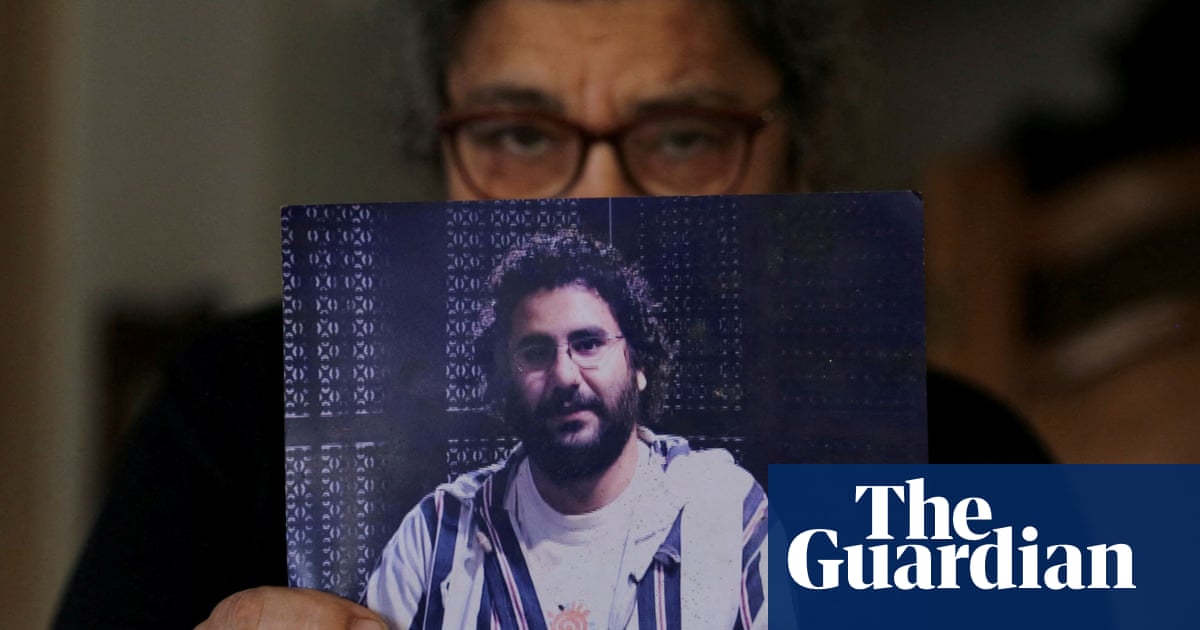The former British ambassador toEgypt, John Casson, has urged the UK to advise its citizens against travelling to Egypt, in response to Cairo’s refusal to release dual British Egyptian national Alaa Abd el-Fattah.
AUN panelfound on Wednesday that Fattah had been held arbitrarily in jail since 2019, but Egypt was refusing to give the UK consular access – let alone release him.His mother has been refusing foodin protest at his detention.
Casson, ambassador to Egypt from 2014 to 2018, said: “Egypt pretends to be a friend of the UK and is dependent on British visitors to keep its economy afloat. We have to demonstrate that that is not compatible with abusing our citizens and blocking our embassy.”
He added that the Foreign Office had worked its way through “the normal diplomatic playbook” to secure his release, but this “only revealed Egypt fobbing us off and trying to push us around”.
Casson told the BBC: “It is a police state in Egypt. It is violent and vindictive and it is abusing a British citizen in Alaa Abd el-Fattah.
“It has tortured him and kept him in prison on bogus charges and is causing a lot of distress to his family, but it is also abusing the rights of the British government to do its normal business and it is blocking our embassy from its most fundamental function of visiting and supporting British nationals when they get into trouble.”
He said the advice should be to caution against travel to Egypt –and not just due to this specific case.
As a former ambassador to Egypt, he said “if a friend or family came to me today and asked ‘Should we be booking our winter sun in Egypt?’, I would have to say: ‘You are taking a real risk. If you get into any kind of difficulties, if you post the wrong thing on social media even, there is no guarantee your rights will be protected. There is no guarantee of due process and we cannot even be sure the British embassy will be able to visit you in the normal way.’”
He recalled during his period as ambassador “a Cambridge university student was tortured to death over several days in a prison cell. There was a British woman who went on a beach holiday and found herself in a prison cell for a year due to carrying too many pain killers in her luggage.” There had also been a string of abduction cases.
The travel advice, he said, should be as frank as the advice given to British people thinking of travelling to Hong Kong and Iran.
He believed the case required political will, and had to be a defining issue in the UK relationship with Egypt.
Casson was speaking after co-signing a letter with the Labour peers Lord Hain and Lady Kennedy calling for the British government to advise British nationals not to travel to Egypt.
Cash-strapped and heavily indebted, Egypt is deeply reliant on tourism, which contributed approximately $31bn (£23bn) to its GDP in 2023 and is a provider of nearly 9% of the total jobs in the country. In 2024, Egypt welcomed a record-breaking 15.7 million tourists, surpassing the previous year’s record of 14.9 million. More than 500,000 British people visit Egypt annually.
Current Foreign Office travel advice suggests some parts of Egypt such as Sinai are at risk of terrorism, and also says making critical comments about the government can cause difficulties. There are however no warnings in place about the main tourist spots.
Casson has long been critical of the UK’s inability to find the right levers to persuade the Egyptian president, Abdel Fattah al-Sisi, to release Fattah, but the UN report is another pressure point.
The British prime minister, Keir Starmer, has twice rung the Egyptian president to ask for Fattah’s release, while the UK national security adviser, Jonathan Powell, and the UK foreign secretary, David Lammy, have both raised the case in meetings with their opposite numbers.
It has also been raised by UK diplomats at the UN human rights council, but so far even a preliminary right to see Fattah in jail has been denied by British diplomats on the basis that Egypt does not recognise his dual citizenship. He was charged with spreading false news about Egypt, and has been a long-term critic of the government repression.
